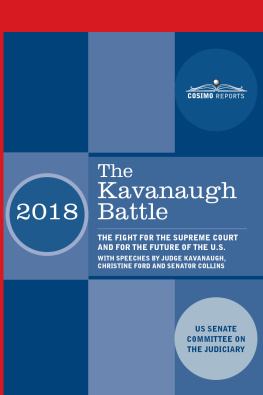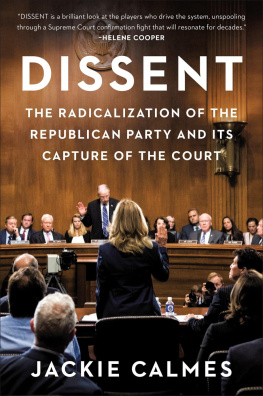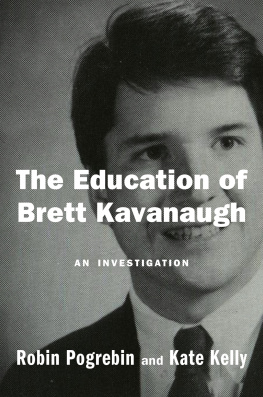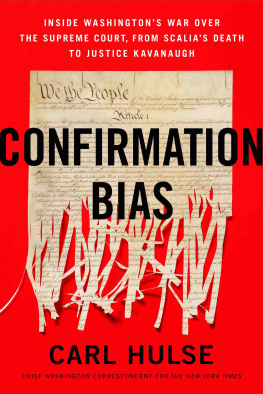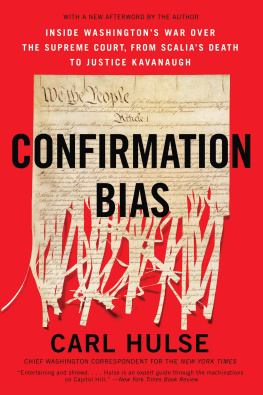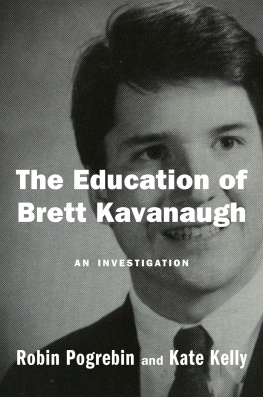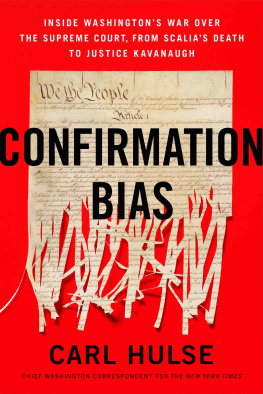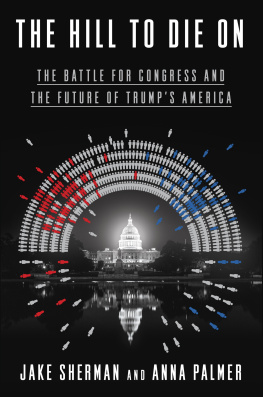The Kavanaugh Battle: The Fight for the Supreme Court and for the Future of the U.S., with Speeches by Judge Kavanaugh, Christine Ford, and Senator Collins. First published in 2018 by the U.S. Senate Judiciary Committee. Current edition published by Cosimo Reports in 2018.
Cover copyright 2018 by Cosimo, Inc.
Cover design by www.popshopstudio.com.
ISBN: 978-1-94593-44-5
Cosimo aims to publish books that inspire, inform, and engage readers worldwide. We use innovative print-on-demand technology that enables books to be printed based on specific customer needs. This approach eliminates an artificial scarcity of publications and allows us to distribute books in the most efficient and environmentally sustainable manner. Cosimo also works with printers and paper manufacturers who practice and encourage sustainable forest management, using paper that has been certified by the FSC, SFI, and PEFC whenever possible.
Ordering Information:
Cosimo publications are available at online bookstores. They may also be purchased for educational, business, or promotional use:
Bulk orders: Special discounts are available on bulk orders for reading groups, organizations, businesses, and others.
Custom-label orders: We offer selected books with your customized cover or logo of choice.
For more information, contact us at www.cosimobooks.com.
Introduction
In this volume you will find the key speeches made during the 2018 nomination process of Judge Kavanaugh to the Supreme Court, the highest Court in the U.S. and the chief arbiter of the Constitution. This nomination process became a true fight for the Supreme Court and for the future of the U.S. Backdrop of this nomination process was what some call the most contentious period in U.S. history since the Civil War, after a hotly disputed presidential election in 2016 unexpectedly won by Donald J. Trump, a continuing FBI investigation of a possible collusion between Donald Trumps campaign and Russian operatives, dubious roles played by social media giants, protests by anti-Trump supporters, and a breakdown of civility in political discourse.
Judge Kavanaugh was Trumps second Supreme Court nomination and he was nominated on July 9, 2018, to succeed retiring Justice Kennedy. Justice Kennedy, nominated to the Supreme Court in 1987 by Republican President Ronald Reagan, was a swing vote who sometimes sided with the Democratic appointees and tipped the balance between the other four Republican appointees and the four Democratic appointees. Kavanaugh, however, was expected to be more conservative than Kennedy. Kavanaugh was a U.S. Court of Appeals Judge for the D.C. Circuit since 2006, had served in both Bush administrations, and had worked on the special counsel investigation that led to President Bill Clintons impeachment in 1998. As the fifth conservative judge on the court, Kavanaughs nomination would create a reliable conservative majority on the Court for the first time since the New Deal. With a narrow Republican majority in the Senate of 5149, the battle lines were drawn. However, could anyone expect this nomination process to become as vicious and controversial as it did?
The confirmation hearings before the Senate Judiciary Committeewhich is made up of 21 senators, 10 democrats and 11 republicansstarted on September 4, 2018. At that time it appeared that Kavanaugh would get through the nomination process, albeit narrowly. However, a few weeks later rumors about sexual allegations against Kavanaugh plunged the nomination process into turmoil. Christine Blasey Ford, a professor of psychology at Palo Alto University in California, accused Kavanaugh of having sexually assaulted her 36 years ago at a high school party. Ford claimed that this incident has caused her years of anxiety. In a public response, Kavanaugh categorically and unequivocally denied the allegation.
On September 27, 2018, Christine Ford and Judge Kavanaugh appeared before the Senate Judiciary Committee. After Fords opening statement, she was questioned on the Republican side not by the (all male) Republican senators on the Committee, but by Rachel Mitchell, an Arizona sex crimes prosecutor hired by the Republican members as staff counsel for the Senate Judiciary Committee. Ford told the senators she is 100% certain that Kavanaugh assaulted her when she was 15 years old and he 17. Her testimony was followed by a passionate and at times angry Kavanaugh, who ended his opening statement by saying: . I swear today under oath before the Senate and the nation, before my family and God, I am innocent of this charge.
Who to believe and what to believe? The case was debated heatedly by pundits in the media, and the political temperature reached fever pitch. On September 28, the Committee agreed to move the nomination to the Senate floor, under the condition that an additional FBI investigation into the allegations would take place before the full Senate vote. In the following week, President Trump, who had been uncharacteristically civil and moderate in his comments on the nomination process, started mocking Fords testimony. This in turn led several key Republican Senators, among whom were Senators Murkowski and Collins, to criticize President Trump. Would this tip the balance against Kavanaughs nomination?
The FBI report to the Committee on October 4 didnt result in any further consequences for Kavanaugh. In the meanwhile, Rachel Mitchell, the sex crimes prosecutor, released her own memo stating that Fords allegations are weaker than the usual he said, she said case: I do not think that a reasonable prosecutor would bring this case, based on the evidence, before the Committee, she said.
On Saturday, October 6, the Senate confirmed Kavanaugh to the Supreme Court with a 5048 vote. Senator Lisa Murkowski of Alaska was the only Republican opposing the nominationbut withdrew her vote because her Republican colleague Senator Steve Daines could not attend the vote. Senator Joe Manchin of West Virginia was the only Democrat who voted for confirmation. Senator Susan Collins of Maine, a key swing vote, also voted for confirmation in a floor speech that laid out clearly the legal, political and historical reasons why she voted for this nomination: I cannot abandon certain fundamental legal principlesabout due process, the presumption of innocence, and fairness
One of the most bitter confirmation debates in U.S. history has ended and Justice Kavanaugh was sworn in as Justice of the Supreme Court on October 8. Clearly the Republicans have won a historic victory with the Kavanaugh battle. With five conservative justicesand potentially one or two liberal judges retiring in the next few yearsthe future of the Court points towards conservatism and constitutionalism. There are many losers, however. The sight of a shamefully politicized process has negatively influenced many voters. The political chasm in the U.S. has widened further, making any compromise harder to achieve. And the Democratic Party appears to be the big loser for now. As conservative commentator Pat Buchanan described it aptly, for the Democratic Party, the Kavanaugh battle was the Little Bighorn, as seen from General Custers point of view. Still, the hostilities between liberals and conservatives, between Hollywood elites and Middle America, and between Trump populists and the globalists are not over. Time will tell what the real significance of the Kavanaugh battle will be.

